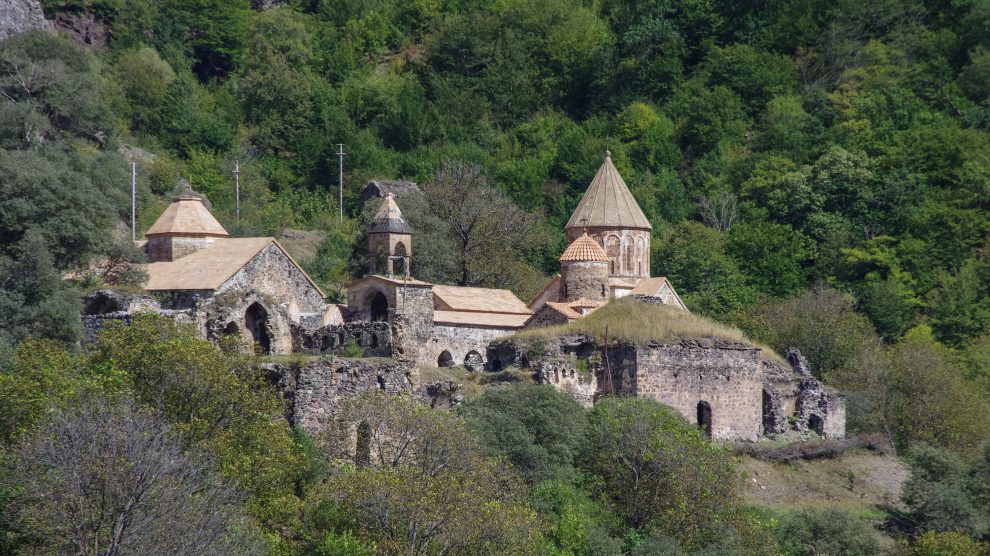Shortages of medicine and food have become pressing concerns in the disputed region of Nagorno-Karabakh.
Amnesty has become the latest international organisation to call the ongoing blockade of the Lachin Corridor as a danger to the lives of thousands of people living in Azerbaijan’s breakaway region of Nagorno-Karabakh.
The human rights organisation has called on Azerbaijan’s authorities and Russian peacekeepers to immediately unblock the route and bring an end to the unfolding humanitarian crisis.
- Explainer: Azerbaijan, Iran and the crisis in the South Caucasus
- Stalemate in Nagorno-Karabakh
- Washington ups courtship of Armenia, Russia’s wavering ally
In September 2020, a full-scale war broke out between Azerbaijan and Armenia over the territory of Nagorno-Karabakh, during which both sides committed violations of international humanitarian law, including war crimes.
Following a tripartite agreement backed by Russia, Azerbaijan regained control over large parts of the self-proclaimed republic, successfully cutting its ties with Armenia. According to the terms of the ceasefire agreement, the so-called Lachin Corridor remained the only road connecting Nagorno-Karabakh with Armenia, the security of which was to be provided by the Russian peacekeeping contingent.
However, the Lachin Corridor has been inaccessible to all civilian and commercial traffic since December 12 last year, after being blockaded by dozens of Azerbaijani protesters, widely believed to be backed by the country’s authorities.
The situation has left some 120,000 ethnic Armenian residents in Nagorno-Karabakh without access to essential goods and services, including life-saving medication and health care.
“The blockade has resulted in severe shortages of food and medical supplies, as humanitarian aid delivered by the International Committee of the Red Cross (ICRC) and Russian peacekeepers has been insufficient to meet demand,” says Marie Struthers, Amnesty International’s director for Eastern Europe and Central Asia.
“Disruptions to the supply of electricity, natural gas and vehicle fuel add up to extreme hardship, especially for groups who are vulnerable to discrimination and marginalisation. This must end now.”
Azerbaijan’s obligation
Struthers claims that as the Azerbaijani authorities have internationally recognised sovereignty over these territories and exercise control over the territory from which the blockade is being carried out, “it is Azerbaijan’s obligation to undertake to ensure that the population in Nagorno-Karabakh is not denied access to food and other essential goods and medications.
“For its part, the Russian peacekeeping mission is mandated to ensure the safety of the Lachin corridor. However, both parties are manifestly failing to fulfil their obligations,” she adds.
Russia last week rejected suggestions that EU or UN peacekeepers could be brought in.
According to Nagorno-Karabakh de-facto officials, since the blockade began the number of vehicles arriving in the region has decreased from 1,200 a day to just five to six trucks belonging to the Russian peacekeeping mission and the ICRC.
Access to healthcare has become the most pressing issue in the blockaded region, with a deficit of medicines and medical supplies as well as insufficient fuel to enable outpatient care. The situation is particularly acute for older people and people with disabilities, many with chronic health conditions, whose access to healthcare services is severely limited or in some cases completely disrupted.

Food rationing
The blockade has also caused a food shortage, which led the de-facto authorities to introduce a rationing system in early January.
According to one resident: “each individual can get half a kilo of rice, pasta and one litre of oil and little sugar,” limiting products by one kilo or litre per month per person, regardless of age.
Other people interviewed by Amnesty said that while those efforts had helped prevent spiking prices for essential food products, fresh vegetables and fruits have completely disappeared from store shelves, while long queues form for milk and eggs when they become available.
Shortages of gas and petrol meanwhile are further exacerbated by frequent cuts to the supply of gas from Azerbaijan and electricity cuts that last an average of six hours a day.
“With the blockade now in its ninth week, all eyes are on the Azerbaijani authorities and Russian peacekeepers. We call on both parties to immediately take effective measures, in line with international human rights standards, to lift the blockade of the Lachin Corridor without any further delay and end the unfolding humanitarian crisis,” adds Struthers.
On February 14, Congresswoman Anna Eshoo called for more US efforts to bring an end to the man-made humanitarian crisis.
“As Azerbaijan’s cruel blockade enters its third month, the US must step up our efforts to bring an end to this man-made humanitarian crisis,” she said.
Unlike many news and information platforms, Emerging Europe is free to read, and always will be. There is no paywall here. We are independent, not affiliated with nor representing any political party or business organisation. We want the very best for emerging Europe, nothing more, nothing less. Your support will help us continue to spread the word about this amazing region.
You can contribute here. Thank you.







Add Comment